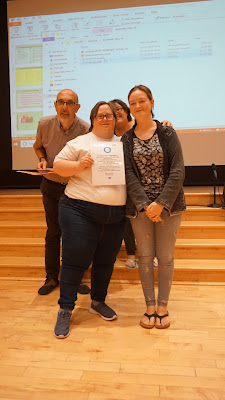These are photographs of residents on Camphill Milton Keynes doing Diabetic training at the Chrysalis Theatre.
Diabetes is a lifelong condition that causes a person's blood sugar level to become too high.
There are 2 main types of diabetes:
Type 1 diabetes - where the body's immune system attacks and destroys the cells that produce insulin.
Type 2 diabetes - where the body doesn't produce enough insulin, or the body's cells don't react to insulin.
Type 2 diabetes is far more common than type 1. In the UK, around 90% of all adults with diabetes have type 2.
If you're diagnosed with diabetes, you'll need to eat healthily, take regular exercise and carry out regular blood tests to ensure your blood glucose levels stay balanced.
Alex Fox






































